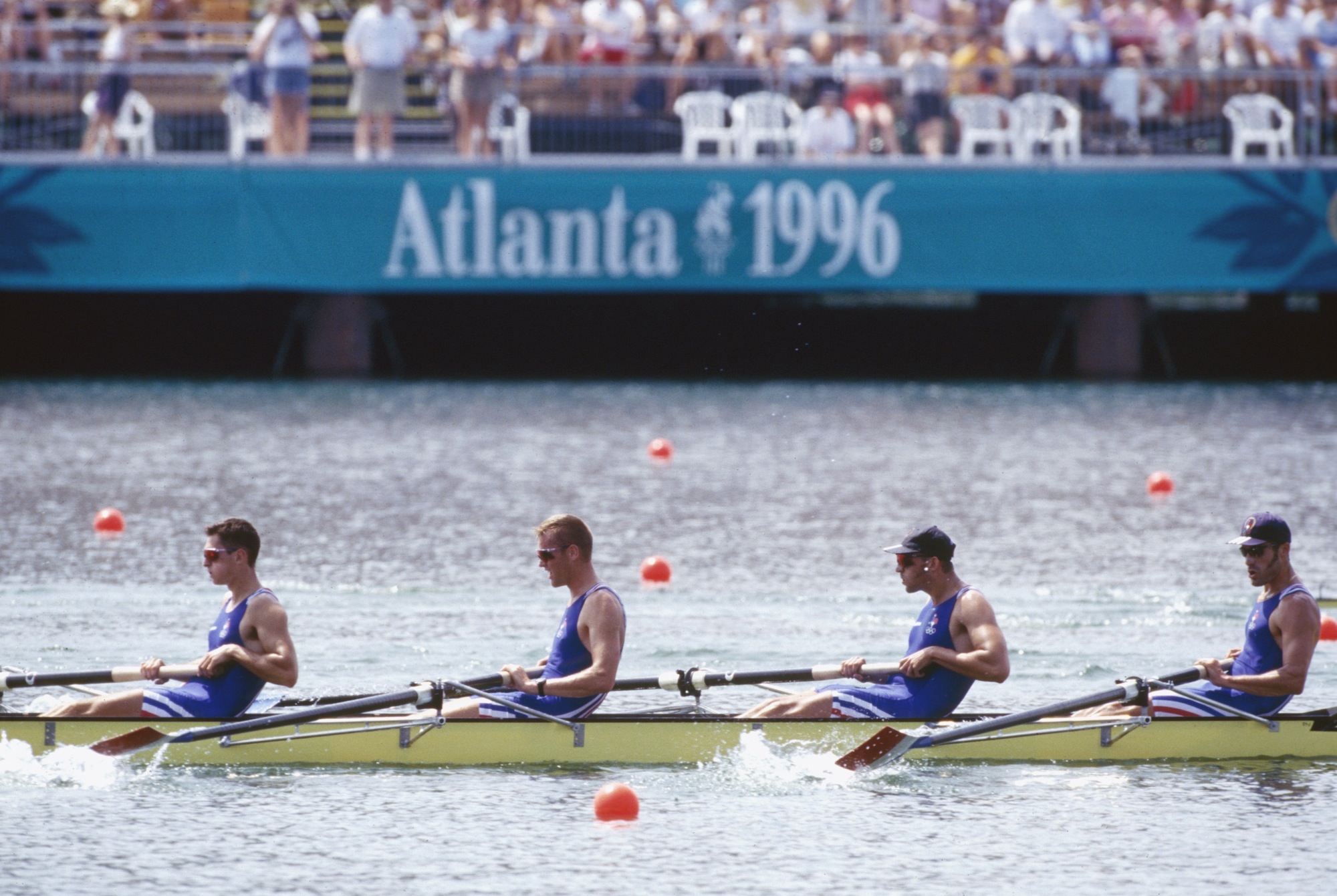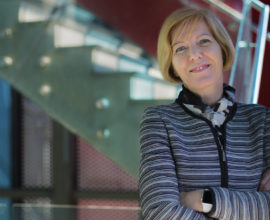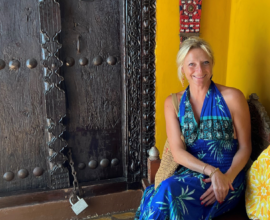Bertrand Vecten
Man of the earth, master of the waters
![]() Reading Time: 9 minutes
Reading Time: 9 minutes
Events manager – International Olympic Committee France
Discreet by nature, Bertrand Vecten (MROS 99) was by no means predestined to become a legend when, back in the summer of 1996, the tip of his boat sped forward inching towards Olympic silver, in one of the closest-contested finals in rowing history. He seldom talks about this medal, out of sheer modesty and a refusal to allow his past achievements to define him, or see this award eclipsing the effort and human adventure from which it arose.
Today, 51-year-old Bertrand is Olympic Ticketing Lead for the French National Olympic and Sports Committee (CNOSF). He agrees to share his story only to emphasise the transformative power of sport on people’s lives, as indeed is the case for him. It transformed the life of a young lad from Compiègne, exempt from PE classes in secondary school, to one day become Olympic vice-champion.
When did you first dream of competing at the Olympics?
My ambition has never been to become a champion or to beat others: I was just curious to know my limits and see how far I could go. The idea of the Games came during my own journey, in quite a gradual way, as I reached the goals set by my coach, who also became my mentor. However, I do have a very clear recollection of how I first learned about the sport and began rowing.
So, you weren’t familiar with rowing at all before taking up this sport?
I hadn’t even seen it prior to this.
I come from a small village near Compiègne: I am the fifth and youngest child of a farming family and we were not raised in a culture that promoted sports or competition.
Yet, at primary school, an ongoing knee problem led me to Professor Saillant, the specialist surgeon of Ronaldo and Schumacher, who issued me with a total exemption from sports, to avoid having to operate on me. Two years later, towards the end of Year 8, came a complete turnaround: my knee was better and Professor Saillant instructed me to take up a sport.
He talked to me about cycling, swimming, and rowing, a sport without risk to my knee as well as a great physical activity, he explained. This is what led me to go along to the rowing club in Compiègne.
It took a while before I got to grips with how to move the boat forward but I immediately took to this outdoor team sport, where everyone was addressed by their first name, in stark contrast to school where surnames remained the norm. This opened up a whole new world to me.
Were your sights never set on a sporting career?
No! My sole goal was to be in good shape, both physically and personally. But that was as far as it went. At the back of my mind, I still had the idea of returning to my studies and working in the agricultural sector.
The tipping point in my life came about five years later when, at the age of 19, a new trainer arrived at the club. A year later, my pair partner and I were awarded our first ever medal at the French Championships. The following year, I joined the French team, whilst continuing to study for a BTS (a two-year HNC technical degree) in Agrifood Sales Strategies.
However, my pair partner decided to stop and the trainer of the French team paired me up with a new partner from Nantes. This is how I came to leave Compiègne and settle in Nantes.
What was life like for you back then?
Even at a high level, in the 90s rowing remained an amateur sport, so I still had to earn my own living. That’s how I came to join the MAIF, a partner of the French Rowing Federation, who were interested in my profile which stood out from all those with a background in engineering, physiotherapy, or the sports science students on the STAPS, making up the majority of the other rowers.
Rowing is a discipline based on commitment and substance, where the training ratio is 95% for 5% of competitions: three qualifying weekends for the French Championships, three European regattas, and the World Championships. So, we trained on the Erdre waterway, both mornings and evenings, before or after work. This makes for full-on days, leaving little time to rest and recuperate: I was doing two days in one, as a friend of mine would say.
In 1994, we became finalists in the Men’s Eight at the World Championships in Indianapolis, then, in the following year, 4th in the Coxless Four Men in Finland, enabling us to qualify the boat for the Atlanta Games, accessible for the first time by earning the qualification quota.
Thus, in 1996, after months of preparation, the trainers trusted us once again to take the boat to the Games where we ended up being awarded silver, a hair’s breadth ahead of the English. This Olympic medal represents a great sporting feat, but above all symbolises a human adventure and a true personal achievement.

At times, we get the impression you allowed yourself to be guided along.
Maybe so. One thing’s for sure, I put in a lot of hard graft, without overthinking things. Each time I ticked one of the boxes or brought home a victory, I wanted to push things on to the next level. Not out of striving to be the best or to win money, it was more a case of wanting to push my own limits. This notion of progression remains at the heart of my entire career.
This is how I made it onto the rising-star French team, by throwing everything I had at the training for an entire summer long, mornings and evenings, to earn a place that the trainer had been dangling like a carrot in front of me, to qualify for the French Championships.
Hanging on in there and working hard has made me who I am today, and this is the philosophy I try to pass on to my own children, even though I don’t really like talking about myself much. Moreover, I’m not sure whether my children have ever seen my medal and my 16-year-old son only just saw the Olympic final on the Internet a few weeks back.
Didn’t you want to encourage them to get into sport?
I prefer to let them discover it for themselves. They have done some rowing but that’s as far as it goes. They flit about, switching activities every two or three years. It goes against my own philosophy in life, since I believe that nothing just falls into your lap by chance, without you putting in the work. But that’s something they’ll have to work out for themselves.
The main thing is that they take regular physical exercise and have their own unique experiences and paths in life. I like the idea of passing things on without drilling it into them. Today, my eldest daughter wants to go abroad and my youngest wants to clean up the oceans. As for my son, well he’s interested in the army. I encourage them to pursue their projects and provide them with my support, as much as I can that is. But if they want to change, six months or even ten years down the line, I’ll still be here to support them. We’re all allowed to make mistakes, what’s important is not to allow the choices of someone else dictate to our own.
So, tell us how you went from a podium in Atlanta to a seat of learning at Audencia.
In 1996, I had reached the pinnacle. I knew it would be hard to do any better. After the Games, I returned to the MAIF but, not long after, I felt a need for change and requested further training.
Audencia was within walking distance of the training area, and its all-new Sports Organisations Management MSc looked very promising. At the time, it was the only sports-related specialised master affiliated to a Grande Ecole: a tremendous asset. The broad spectrum of faculty and speakers, and indeed their spirit of openness, proved very enriching and a real challenge for us to rise to.
Primarily, I have only one regret: not having a good enough game plan when choosing my home club in Compiègne for my end-of-studies internship. This was short-sighted on my part and did nothing to draw me out of my comfort zone. It didn’t kickstart me enough to explore new horizons and I’ve always regretted this.
At the same time, it can’t have been easy combining rowing and your master’s in Sports Organisations Management.
This is true. I defended my thesis at the end of 1999 and, in parallel, I made the decision to leave the French team. I had been struggling with a recurrent injury and was no longer fully on board with the system that had been put in place. The group was no longer a good fit for me and I found myself struggling to see how we could ever have a repeat performance of our Atlanta exploit.
I pulled out of the French team just a few months ahead of the Sydney Games. I joined a friend in England to help me turn the page and set myself the challenge of learning English. A kind of hiatus so to speak, that opened me up to others and indeed the world. The homebird in me who loved a set routine, which high-level sport had served to fortify in my character, got to make many encounters and discoveries in England. And I also rediscovered the joy of rowing at a local club.
Back in 2000, the career transition of athletes was not a hot topic. Was this something you came through on your own?
Yes! After my time in England, I went to work for a distributor specialised in sports equipment, selling rowing machines, exercise bikes, and the like. This was a small family structure, rather like that of a team, in which I was tasked with their marketing and business development, with the dual benefit for me of being constantly on the go, whilst working in a very tight framework. This dynamic routine suited me down to the ground and stimulated me.
I stayed there for sixteen years, until I no longer felt aligned with the management. Sensing I was missing out on some great projects, the time had come for me to leave. During this time, I went through a period of major professional drifting, with two short-lived experiences with a few months of unemployment in between. On a personal level, this wasn’t a great time for me either, since I was in the middle of a divorce, and looking for a project to get me back on track. I was dealing with situations as and when they arose!
Then, I met with the CNOSF (the French National and Olympic Sports Committee) after replying to a job creation post related to the Games’ legacy. The project had been pushed back on two occasions, then cancelled due to COVID and changes in governance. However, I eventually found my place in the organisation. Today, I head up a range of projects related to the 2024 Games in Paris, in particular the ticketing for our member Federations, volunteers at the clubs, as well as the athletes’ supporters and families. This is a complex matter due to the severe constraints on ticketing – digital, bearing the holder’s name and forgery-proof – and the many expectations to be met. But this is something new and exciting: a real discovery.
What are your biggest takeaways from your personal career journey since graduating from the MOS?
The activity I’m involved in today is a far cry from what I initially trained to do some 25 years ago now, however the MOS provided a real boost, helping me to kickstart my career change. It enabled me to move forward and transition towards a different career path. It also gave me the recognition that comes with a degree: in my eyes, this is the main thing.
Yet, if I could give some advice to my younger student self, I would say to choose my internship more wisely, and to think more strategically, which is a side to me I’ve always struggled with. Internships directly impact one’s initial professional experience, with a de-facto influence on how a career pans out. Individuals who got off to a good start very quickly gained access to top positions working for large companies such as Nike or the FDJ. They are also less exposed to risks over the long term, and are likely to hold more fulfilling roles. So, choose well!
So, what next?
I’m a firm believer in the power of who you meet. Looking back, I can identify three people who have proved decisive to my career path. After coming through a long, tough time, I feel I’ve cultivated the right mindset for success. I sense, and sincerely hope, that the planets are all aligned for me once again.
Do you still work out?
I swim in a club twice a week and have done so for the past ten years, and every year I do one or two open water swimming trials. I run too, an hour or so every now and then, but less and less so now, as the trailer runners I hang out with, though great, run long distances, which I try to avoid for fear of injury.
Sport is a central part of my life and so is at the heart of my professional future. This remains the case, be that in the corporate world or in the intangible legacy of the Games, with the sporting impact they stand to leave on our daily lives. For we are sitting on a ticking public health time bomb, that physical activity has the power to defuse. And this is an adventure I intend to be part of.
Perhaps by sharing how sport had a hand in rewriting the destiny mapped out for me. Also, what it has given me; this competitive spirit still serving in my day-to-day life, which I try to instil in those around me, and indeed my partner who is battling an illness with great determination. For great champions are not always to be found on podiums.

